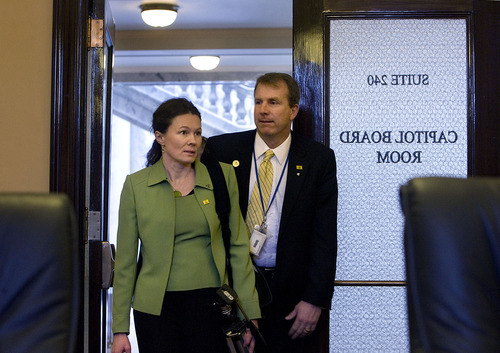This is an archived article that was published on sltrib.com in 2011, and information in the article may be outdated. It is provided only for personal research purposes and may not be reprinted.
Rep. Stephen Sandstrom has agreed to a deal with legislative leaders in which he will remove the words "reasonable suspicion" from his legislation to have local police check the legal residency of people arrested or pulled over. In exchange, he has assurances of the likely passage of his enforcement-only bill in the Senate, knowledgeable sources confirmed Monday.
Senate President Michael Waddoups said he requested a meeting with Sandstrom Friday to voice concerns about the bill's links to Arizona's SB1070 — the law signed by Gov. Jan Brewer that has made that state the face of tough, state-based immigration reform bills.
"We're asking him to make it in the format he wants," Waddoups said. "With all of the objectionable things taken out."
That format could include requiring Sandstrom to request a new bill file be opened on the House floor, giving it a new name and a new title — and, the Senate hopes — a new image that distances the bill from Arizona's law.
Sandstrom said at this point he didn't know if he would rename and renumber the measure.
"I would say possibly," Sandstrom said. "But right now, no."
The deal was struck because the House wanted to pass an enforcement-only piece of legislation and the Senate wanted to pass a guest-worker bill. Sandstrom and his key allies in the House — Reps. Chris Herrod and Carl Wimmer — were sour on guest-worker programs, claiming Utah had no ability to get the waivers needed from the federal government to make it a reality.
But Sen. Curtis Bramble began working on a comprehensive immigration reform bill weeks ago that mainly culled concepts from Sandstrom's enforcement-only bill and Rep. Bill Wright's guest-worker bill. That bill, SB288 — dubbed the Utah Compact Immigration Bill — gathered steam and support from the Senate Republican caucus, Lt. Gov. Greg Bell and Gov. Gary Herbert.
The Senate also passed out of committee by a 3-2 vote a pilot program needing a federal waiver by Sen. Luz Robles, D-Salt Lake City. Both Bramble's and Robles' bills illustrated the difference in the Senate and House views on the immigration issue.
Waddoups said he expected two immigration bills to emerge out of the legislative session — though conceded there could be as many as five — including a new Sandstrom entry that would allow Utah to issue H2 work permits through the federal government as a part of a pilot program bringing workers from Mexico to the United States for businesses that can't find U.S. citizens to fill the jobs.
Bramble said he is the Senate sponsor on that bill.
The current pieces in place allow for the Legislature to move on the issue of immigration — though it's unclear how the new deal will be received.
"We can't always control perception," Bramble said. "We can pass what we think is good public policy. Beyond that, it is difficult to control perception."
But Waddoups also conceded there is concern about Sandstrom leaning heavily on Arizona statistics to bolster the case for his bill.
Even on Monday at the Capitol, Sandstrom joined Herrod, Wimmer, Rep. Dave Clark and several tea party and immigration reform groups at the Capitol Board Room and rattled off a series of crime statistics provided to him by Brewer's office and Arizona Senate President Russell Pearce's office.
The group also took turns ripping on Bramble and his bill.
Ron Mortensen, co-founder of the Utah Coalition on Illegal Immigration, said the Bramble bill was the "chamber of commerce Dream Act." And Sandstrom likened Bramble and his bill to former House Speaker Nancy Pelosi's attempt to push President Barack Obama's health care reform package through Congress.
Mortensen called Bramble's moves "Chicago-style politics."
Sandstrom, who was at the gathering, said later "it wasn't my press conference" and suggested he shouldn't have "gone so far against the Bramble bill."
Bramble's bill will be heard in committee Tuesday afternoon.
Immigration deals
The House and Senate have been at odds over immigration legislation. The House favors an enforcement-only bill and the Senate wants to pass guest-worker legislation. A deal being worked out behind the scenes may allow both to get their wishes, though Senate leaders want to make sure the enforcement-only bill takes steps to distance it from Arizona's controversial immigration law.



